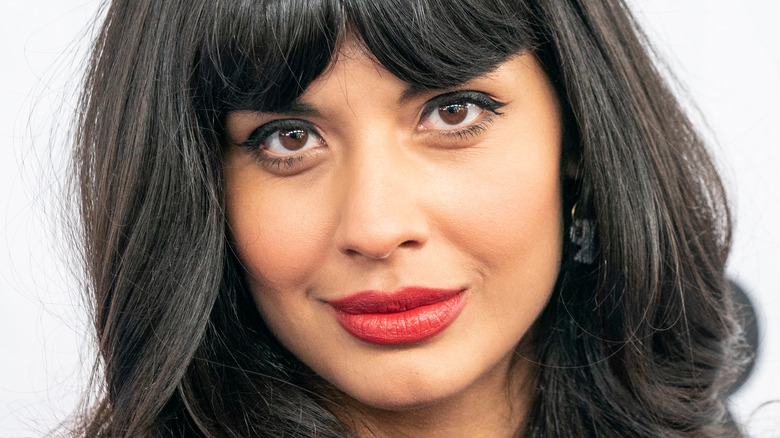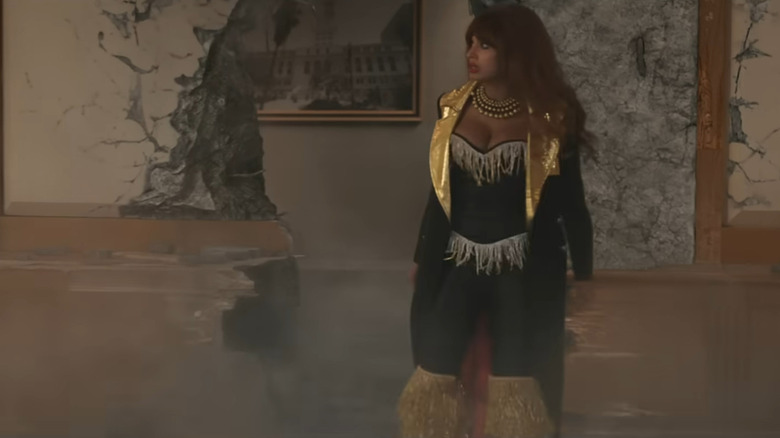Jameela Jamil's Character In She-Hulk Answers A Question Literally Nobody Was Asking
The Marvel Cinematic Universe finally gave audiences an episodic adventure with "She-Hulk: Attorney at Law." While, yes, Disney+ has churned out seven other serialized projects (not including "I Am Groot"), they've all been, essentially, six-hour movies spliced into a varying number of segments. In fairness, "Ms. Marvel" came incredibly close to embracing the idea that each episode would tackle a self-contained journey, but "She-Hulk" is the first among its kind to wholly embody the concept.
And that's pretty cool because Jennifer Walters, aka She-Hulk (Tatiana Maslany), has to contend with a long list of hand-me-down concepts. She's the second MCU lawyer to be introduced, right behind Matt Murdock, aka Daredevil (Charlie Cox), who canonically appeared in 2021's "Spider-Man: No Way Home," and if Emil Blonsky, aka Abomination (Tim Roth), counts, she's technically the third MCU Hulk. In a more obtuse way, she doesn't even get to be the first fourth wall-breaking hero either, since if Wade Wilson, aka Deadpool (Ryan Reynolds), exists in one universe, he kind of exists in them all. Despite this, Walters wears these aspects as if they were tailor-made for her.
Well-deserved praise aside, "She-Hulk" offers another MCU first that "Ms. Marvel" laid the groundwork for: the concept of social media's presence in-universe. Where Zoe Zimmer (Laurel Marsden) was a copyright-safe TikTok star at her local high school, a perk Kamala Khan (Iman Vellani) used to her advantage to expose a corrupt, racist government agency, "She-Hulk" takes that idea to its natural conclusion with the introduction of Titania (Jameela Jamil), a superpowered social media influencer.
Enhanced individuals are becoming social media influencers
Minor spoilers for "She-Hulk" Episode 2 beyond this point...
Titania's professional choices are casually mentioned at the start of the second episode, where a news ticker reads, "Super Influencer Causes Panic." Now, this is obviously a far cry from Titania's comics origin given that influencers didn't even exist in the 1980s when Jim Shooter and Mike Zeck created her. In this way, it's safe — required, even — to assume that "She-Hulk" is counting on our current cultural understanding of the word for context.
If there were enhanced individuals in our world, it's a good guess that at least one of them would go the influencer route. There would be YouTube videos with titles like "I Flew to Paris for Breakfast (NOT CLICKBAIT)" or "Can My Laser Vision Cut Through THIS?!?!" Some speedster would inevitably livestream themselves breaking the sound barrier and subsequently their phone, and let's not even begin to think about the obnoxious prank videos.
All this is to say that the term "influencer" is rarely used to describe a person who is broadly likable, not when used inside another piece of media, at any rate. Giving such people superpowers is not exactly going to lead to a positive outcome. With that in mind, while literally no one asked for an enhanced influencer, maybe turning an antagonist into one for a modern audience was actually a brilliant move. It makes the character immediately disquieting in a way that few other careers can allow for.

